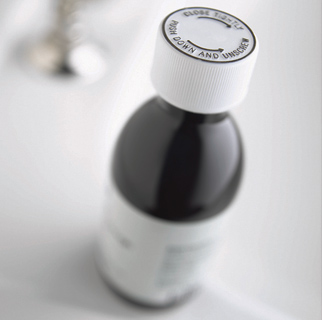Cough Medicine Abuse by Teens

Dextromethorphan (DXM) is a common ingredient found in many cough and cold remedies. It helps stop a cough. Used as directed, DXM products are safe and work well. But DXM has become popular among teens who want a cheap, easy high. DXM was approved by the FDA in 1958. You can find it in at least 70 common over-the-counter (OTC) cough and cold medicines.
DXM has no serious side effects when used in small doses. When taken in larger amounts, it can distort awareness and alter time perception. It can also cause hallucinations.
Cold medicines with DXM also have other ingredients that can be harmful in large amounts. These include acetaminophen or decongestants. Combining high doses of DXM with alcohol is very unsafe, too. It can lead to death.
Abuse on the rise
Cough syrup abuse has been a problem for decades. But the concern in the past had been about the alcohol and codeine in cough and cold products. Because of that, the alcohol has been removed from most OTC cough and cold remedies. State laws also restrict the sale of products that have codeine.
DXM seemed a good substitute to codeine and alcohol. It had few, if any, side effects when used as directed. And a larger amount of DXM (such as drinking several bottles of cough syrup at one time) would cause vomiting.
But today, teens have options beyond drinking the syrup. DXM is available in powder, capsule, and pill forms. You can find it online. These forms can be swallowed or snorted. Some websites even tell users how to extract DXM from cough syrup. They also advise users how much DXM to take to get high. Illegal users may take 240 mg to 1,500 mg of DXM at a time.
Slang terms for DXM include:
Black beauties
Brownies
Dexing
Dextro
Drix
Gel
Groove
Lean
Mega-perls
Poor man's ecstasy
Red devils
Robo, Robo-dosing, Robo-fizzing, or Robo-tripping
Rojo
Rome
Skittles or skittling
Sizzurp or syrup
Sky
Tussin
Velvet
Effects of abuse
The effects of DXM have been compared to PCP and the anesthetic ketamine. All three are called dissociative substances. At high doses, they give the abuser a feeling of not being in one's own body. DXM also causes hallucinations. The effects can last up to 6 hours. But that can vary. It depends on how much DXM is taken and what other drugs or chemicals are taken along with it.
Other effects of DXM include:
Hot flashes
Nausea, vomiting, and dizziness
Lack of coordination
Panic attack or seizures
Impaired judgment
Sweating
Lethargy or drowsiness—or hyperactivity
Slurred speech
High blood pressure
Rapid eye movement
Rash
Racing or pounding heartbeat
Paranoia and hallucinations
Feeling of floating
Regular abuse of DXM at high doses can lead to chemical psychosis. That’s when a person loses contact with reality. They may need to be treated in a hospital. They may also need to take medicine.
What you can do
As a parent, you should warn your children about the dangers of abusing OTC medicines. Some teens believe that OTC medicines are safer to abuse because they are legal.
Here are other suggestions:
Watch the OTC medicines in your home. Keep track of how much medicine is in each bottle.
Don't buy extra OTC medicines to stock up.
Don't allow your children to keep OTC medicines in their bedroom, backpack, or school locker.
Watch your children's Internet use, keeping an eye out for websites visited that discuss OTC or other drug abuse.
Use OTC and prescription medicines responsibly yourself.
Connect with us:
Download our App: